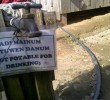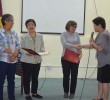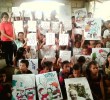Press Release
July 27, 2014
Reference: Piya Macliing Malayao, 0917-3631576, Spokesperson
Lea Fullon, 0998-2972500, Public Information Officer
Faces lit by torches, indigenous Ayta people from various remote areas in Central Luzon performed an indigenous ritual near the gates of the Department of Agrarian Reform on Sunday where progressive groups converged in preparation for the State of the Nation Address (SONA) prostests on Monday. The ritual, which offered the blood of a chicken to Ayta deity Apo Namalyari, was intended to ask for protection and guidance before they join the SONA protests. The ritual also placed a curse upon the President. “He will find himself increasingly alone, isolated and hated,” Edwin Danan, Secretary-General of Central Luzon Ayta Association (CLAA) said.
Danan, clad in red loincloth as is traditionally worn by Ayta people, said that animal offerings were usually performed before they go into the forests to hunt, or to ask guidance for decisions or problems concerning the tribe. This time, however, the ritual will be directed towards President Aquino.
“I am here, along with my tribesmen and other indigenous peoples from different parts of the country, to truly depict the situation of the Philippine indigenous peoples: we are suffering human rights abuse from the hands of government’s armed forces while our lands are taken from us by force to make way for business profit,” Danan said.
“We curse this government for being responsible for extrajudicial killings and other human rights violations, dispossession of our ancestral lands and resources, and economic and social disregard that we suffer,” Danan said. “We renounce this government and curse it with increasing isolation. Aquino will find himself rejected by the Filipino people.”
Piya Macliing Malayao, spokesperson of national indigenous peoples’ organization Kalipunan ng mga Katutubong Mamamayan ng Pilipinas (KAMP) said that the participation of indigenous peoples in the SONA protests is intended to score the administration’s silence on indigenous peoples issues.
“We have come so far from our homes to make the President see the worsening state of the indigenous peoples, Aquino has made no notice on the indigenous peoples in his past SONAs. Even in his reporting on the State of the Nation, we are marginalized,” Malayao said.
According to Malayao, extrajudicial killings among indigenous peoples and the incursion of large-scale mining and energy projects are one of the highlight concerns that the indigenous peoples face today. “Since June 2010, 11 indigenous peoples have been killed per year. These 44 indigenous peoples slain by State agents and mercenaries are still in want of justice. Aquino is definitely not in the tuwid na daan (straight path) into removing the culture of impunity that deprives us of justice for the slain, and the growing number of indigenous peoples’ victims of human rights abuses,” Malayao said.
The inroads of development projects such as large-scale mining and energy projects such as mega-dams, in tandem with the government’s anti-insurgency military campaign Oplan Bayanihan is seen as the cause for the killings and human rights abuse committed to indigenous peoples.
“Legalized by the Mining Act of 1995, Aquino has attracted mining TNCs to invest in our country’s mineral lands, which are usually in the lands of the indigenous peoples. The struggle of indigenous peoples against the plunder of our national patrimony has been met with terror,” Malayao said. “The same goes with other so-called development projects encroaching on our lands.”
According to KAMP, 532,368.36 hectares of ancestral lands have approved mining applications while more than 124,000 hectares of ancestral lands will be dispossessed to indigenous peoples to make way for plantations. Mega-dams, on the other hand will inundate more than 116,596 hectares of ancestral land, KAMP said.
“As Aquino reports what he considers as ‘achievements’ of his government, no one better but the indigenous peoples could belie his claim of ‘development.’ The worst situation of Filipinos could be found in our remote communities, where we experience the least of social services, and most of Aquino’s fascism,” Malayao said. “We are making Aquino accountable for his sins against our people.”










